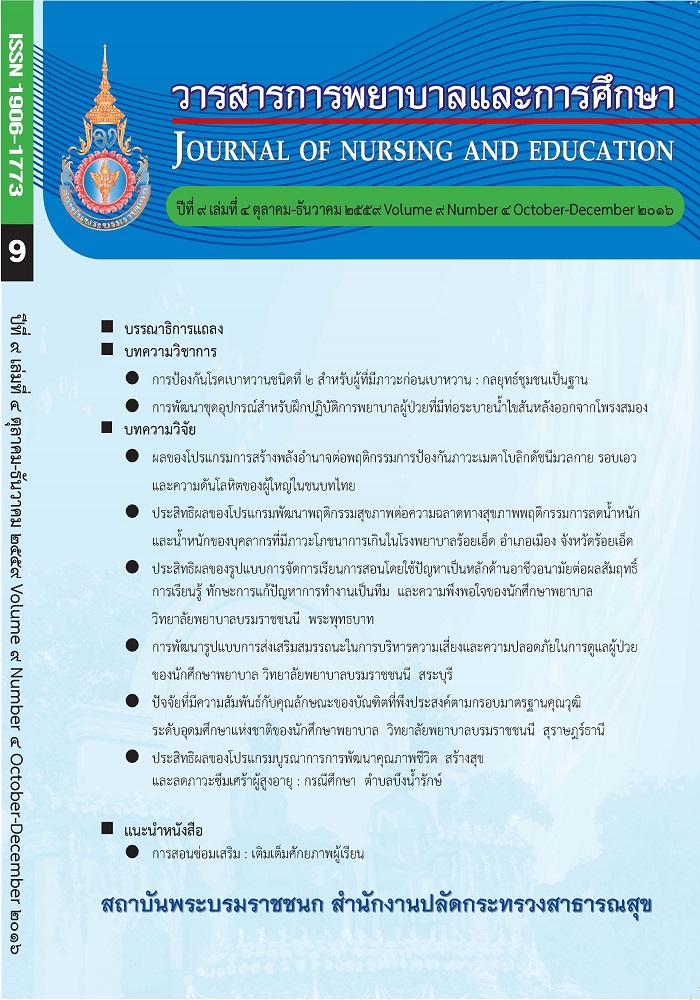ประสิทธิผลของโปรแกรมบูรณาการการพัฒนาคุณภาพชีวิต สร้างสุข และลดภาวะซึมเศร้าผู้สูงอายุ: กรณีศึกษา ตำบลบึงน้ำรักษ์
คำสำคัญ:
Quality of Life, Happiness Enhancement, Depression, Elderly, dialectical behavior therapyบทคัดย่อ
บทคัดย่อ
การศึกษานี้มีวัตถุประสงค์เพื่อศึกษาประสิทธิผลของโปรแกรมบูรณาการพัฒนาคุณภาพชีวิต สร้างสุขและลดภาวะซึมเศร้าแก่ผู้สูงอายุในตำบลบึงน้ำรักษ์ เป็นโปรแกรมที่ผู้วิจัยได้พัฒนาขึ้นโดยการบูรณาการกิจกรรมพัฒนาคุณภาพชีวิตทั้งสี่ด้าน กิจกรรมการสร้างสุขภายใต้แนวคิดจิตวิทยาเชิงบวก และกิจกรรมการลดภาวะซึมเศร้าของผู้สูงอายุที่เน้นการให้การปรึกษาโดยการปรับความคิดและพฤติกรรม โดยประยุกต์ใช้วิธีบำบัดแบบพฤติกรรมบำบัดวิภาษ ที่ช่วยให้ผู้สูงอายุได้จัดการกับความคิดและพฤติกรรมของตนเองใน 4 ด้านด้วยกันคือ การเจริญสติ การยอมรับความเป็นจริง/อดทนต่อความทุกข์ใจ การปรับอารมณ์ความรู้สึกของตนเอง และการพัฒนาความสัมพันธ์ระหว่างบุคคล กลุ่มตัวอย่าง คือ ผู้สูงอายุในตำบลบึงน้ำรักษ์ที่มีอายุตั้งแต่ 60 ปีขึ้นไป และมีความเสี่ยงต่อการเกิดหรือมีภาวะซึมเศร้าตามแบบคัดกรองโรคซึมเศร้า 2 ข้อและ9 ข้อ มีการเลือกตัวอย่างแบบเจาะจงเข้าร่วมโปรแกรมสัปดาห์ละ 1 ครั้ง เข้าร่วมไม่น้อยกว่าร้อยละ 60 จากทั้งหมด 6 ครั้งๆ ละ 2-3 ชั่วโมง ผู้สูงอายุที่เป็นไปตามเกณฑ์เข้าร่วมโปรแกรมจำนวน 22 คน การวิจัยครั้งนี้ใช้รูปแบบการวิจัยแบบกึ่งทดลอง ใช้สถิติวิเคราะห์เชิงพรรณนาและสถิติวิเคราะห์ Wilcoxon Signed Rank Test
ผลการวิจัย พบว่า
1) ผู้สูงอายุที่เข้าร่วมโปรแกรมบูรณาการการพัฒนาคุณภาพชีวิต การสร้างสุขและลดภาวะซึมเศร้ามีระดับคุณภาพชีวิตสูงกว่าก่อนการเข้าร่วมโปรแกรมฯ อย่างมีนัยสำคัญทางสถิติที่ระดับ .001
2) ผู้สูงอายุที่เข้าร่วมโปรแกรมบูรณาการการพัฒนาคุณภาพชีวิต การสร้างสุขและลดภาวะซึมเศร้ามีระดับความสุขสูงกว่าก่อนการเข้าร่วมโปรแกรมฯ อย่างมีนัยสำคัญทางสถิติที่ระดับ .001
3) ผู้สูงอายุที่เข้าร่วมโปรแกรมบูรณาการการพัฒนาคุณภาพชีวิต การสร้างสุขและลดภาวะซึมเศร้ามีระดับภาวะซึมเศร้าต่ำกว่าก่อนการเข้าร่วมโปรแกรมฯ อย่างมีนัยสำคัญทางสถิติที่ระดับ .001
ผลการศึกษานี้สามารถนำไปใช้ในการพัฒนาโปรแกรมพัฒนาคุณภาพชีวิต การสร้างสุขและลดภาวะซึมเศร้าให้แก่ผู้สูงอายุในชุมชนอย่างต่อเนื่องและเป็นรูปธรรมต่อไป
คำสำคัญ : คุณภาพชีวิต สร้างสุข ภาวะซึมเศร้า ผู้สูงอายุ พฤติกรรมบำบัดวิภาษ
The Effectiveness of an Integrated Program on Quality of Life, Happiness Enhancement, Depression Reduction: Case Study, Buengnamrak Sub-District
Abstract
The study aimed at investigating the efficacy of an integrated program on quality of life, happiness enhancement, and depression reduction (IQHD Program) among elderly in Buengnamrak Sub-District. The integrated program was developed by applying activities for promoting four dimensions of quality of life, activities based on positive psychology approach, and activities for reducing depression in the elderly based on cognitive behavioral therapy. The integrated program applied the Dialectical Behavior Therapy (DBT) to help the elderly in dealing with their thoughts and behaviors for four modules: Mindfulness, distress tolerance/acceptance, emotion regulation, and interpersonal effectiveness. The sample was selected 22 elders who aged 60 and over, had risk of a depression, screening via the 2Q and the 9Q Questionnaires. The sample was selected purposively to participate in the Integrated Program once a week, at least 60% of totally 6 times, each for 2 -3 hours. A total of 22 elderly participants were met the criteria to include in the program. A Quasi-experimental research was employed. Data were analyzed using descriptive statistics, and Wilcoxon Signed Rank Test.
The results of the study revealed that:
1) After experiment, elders who received the IQHD Program had a significantly higher score of quality of life than that before, at the .001 level.
2) After experiment, elders who received the IQHD Program had a significantly higher score of happiness than that before, at the .001 level.
3) After experiment, elders who received the IQHD Program had a significantly lower score of depression than that before, at the .001 level.
Findings of this study can be applied to the development of the effective program for improving quality of life, enhancing happiness, and reducing depression in the elderly in the community, continuously and concretely.






